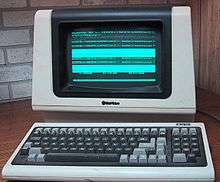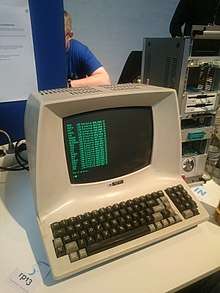TeleVideo
TeleVideo Corporation was a U.S. company that achieved its peak of success in the early 1980s producing computer terminals. TeleVideo was founded in 1979 by K. Philip Hwang, a Utah State University graduate born in North Korea[1] who had run a business producing CRT monitors for arcade games since 1975. The company was headquartered in San Jose, California.

TeleVideo's terminal protocol was popular in the early days of microcomputers and was widely supported by applications as well as terminal emulators (often referred to as "TeleVideo 925 emulation").[3]
TeleVideo also built CP/M-compatible 8-bit desktop and portable personal computers based on the Z80 processor. Up to sixteen of these machines could be connected to proprietary multi-user systems through serial interfaces.[4] In April, 1983, TeleVideo introduced an MS-DOS 2.0 compatible personal computer based on the Intel 8088. This was introduced as the Model TS-1603 and included 128 KB RAM (expandable up to 256 KB), integrated monitor, modem and keyboard. The Model TS-1603 ran both TeleVideo PC DOS 2.0 and CP/M-86 1.1.
The company later turned to manufacturing Windows compatible Thin client computers,[5] but eventually sold this business line to Neoware in October 2005.[6] The latter was subsequently taken over by Hewlett-Packard in 2007.[7]
On March 14, 2006, TeleVideo, Inc. filed a voluntary petition for reorganization under Chapter 11 of the United States Bankruptcy Code.[8]

After more than 35 years in business and with millions of terminals sold worldwide TeleVideo discontinued the manufacturing and sales of all terminal products as of September 30, 2011.[10]
Products

- Terminals[11]: TeleVideo 905, 910, 912, 914, 920, 921, 922, 924, 925, 9320, 935, 950, 955, 965, 970, 990, 995-65, Personal Terminal
- Graphic boards for Terminals: 914GR, 924GR, 970GR
- CP/M-86 systems: TeleVideo TS-1603, TS-800, TS-802, TS-803
- TeleVideo TPC-1, a portable CP/M system similar to the Osborne-1
- Early multi-user systems: TeleVideo TS-806 (6 users), TS-816 (16 users)[12]
References
- ↑ USU Alumni newsletter, Feb. 2004 Archived 2009-05-17 at the Wayback Machine.
- ↑ Installation and User's Guide, http://vt100.net/televideo/tvi925_ig.pdf
- ↑ e.g. Rogue Wave's HostAccess Archived 2009-05-03 at the Wayback Machine.
- ↑ "Eight bit CP/M-based systems connect into 16-user network". IEEE Computer, Volume 16 Number 2, Pages 88-93. 1983-02-01. Retrieved 2009-05-14.
- ↑ "TeleVideo Releases TeleCLIENT Windows-Based Terminals With Microsoft RDP 5.0". Press release. 2000-09-26. Retrieved 2009-05-14.
- ↑ "TeleVideo, Inc. Announces Sale of Thin Client Business to Neoware Systems, Inc". Press release. 2005-10-07. Archived from the original on June 6, 2012. Retrieved 2009-05-14.
- ↑ "HP Closes Neoware Acquisition". HP Newsroom. HP. 2007-10-01. Retrieved 2009-05-14.
- ↑ "TELEVIDEO INC, Form 8-K, Current Report, Filing Date Mar 15, 2006". secdatabase.com. Retrieved May 15, 2018.
- ↑ "TeleVideo Chapter 11 Petition" (PDF). PacerMonitor. PacerMonitor. Retrieved 7 June 2016.
- ↑ http://www.televideo.com/
- ↑ http://terminals-wiki.org/wiki/index.php/Category:TeleVideo
- ↑ www.vintagecomputer.net/televideo/ts-816/